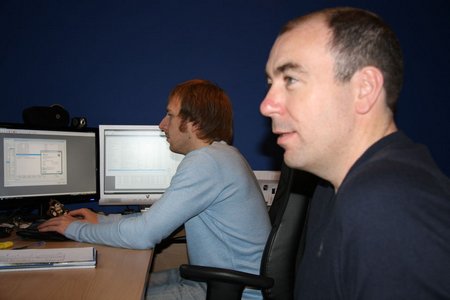 The tough business of software
The tough business of software
A profile of Administer Software
Colin Wynn has earned his living writing software for removal companies the whole of his working life. Today he runs Administer Software one of the UK’s most successful IT companies to our industry. Steve Jordan, R&S Editor, made the journey to Alton to find out a little more.
It was back in 1986 when Reagan and Thatcher dominated western politics, and both the Space Shuttle Columbia and the nuclear power plant at Chernobyl exploded that Colin Wynn made his first tentative steps into the world of IT. He was just a teenager when he did a YTS (Youth Training Scheme) course gaining work experience with a small software company in Wales working on a job for a removals client. When the course came to an end the company took him on full time. The die was cast.
The company was Harmeston Software and Colin worked there for 4 years until it went into liquidation in 1989. By that time the company had built up an impressive list of removal clients all using their product Remstar. “There wasn’t really anything else on the market at that time,” said Colin. “Harmeston was probably the first company to develop a software package specifically for the moving industry.”
In relation to computing, it was a completely different world in those days. In the 1980s many people were interested in what computer systems could do for them but they didn’t have the hardware. Computers themselves were, of course, relatively expensive compared with today. “Now it’s different,” said Colin. “Now everyone has the hardware and doesn’t want to spend money on software because they think they can do everything with Microsoft.”
John McGinty formerly of Alton Moves bought assets of Harmeston Software when it went into liquidation, created Easi-Move Software and employed Colin to run and develop the company. Again the company was true to its roots and specialised in removals with Colin frequently attending Area meetings and conferences. John sold Easi-Move in 2000 and Colin left 3 years later. Easi-Move still produces Remstar 2.
Colin started his own company Administer Software in 2004 after the restrictive covenants lapsed. “I wanted a name that I could tag onto products,” he explained. His products are called Move Administer and Survey Administer. There are also bolt-on modules for shipping, commercial and self storage. New modules, Crate Administer, Resource Administer and Warehouse Administer, are in the pipeline.
The system handles the entire process from taking the enquiry to sending out the invoice. It’s even possible for invoices to be sent out automatically by email saving money and helping users get paid faster. At around £3,000 for the basic Move Administer product, payback for a company that currently has no integrated system is very fast.
Differentiating his product from others Colin said that Move Administer doesn’t rely on any other software so there are never any compatibility problems. For example it doesn’t use Microsoft Outlook to send emails; there’s no need for a separate word processing package such as Microsoft Word to write letters; nor is it necessary to have Excel to look at reports: all are built into the Move Administer system. “Of course if users have these applications they can still send them as attachments,” Colin explained. Not all software currently on the market has this facility.
There’s also no need for the user to have Sage, or some other accounting package to see account transaction history – this is all displayed with each customer’s records on screen. The system contains its own sales ledger that provides aged debtors lists automatically. “It’s really easy to see who owes you money. It provides a complete credit control system and gives comprehensive management information.”
Colin estimates that even now, at the beginning of the 21st Century, around a third of moving companies in the UK still have no computerised administration system. They will have a PC on a desk and might know how to use Word and Excel but they have nothing that brings all the operations of the business together. “Companies take a long time to make decisions then, once they have made up their minds, want it straight away,” he said. “Movers tend to be slow adopters of technology in general. That’s probably because they don’t have a friendly face to help them. That’s our job.”
Asked what he saw as the most likely potential changes in the moving industry in the next few years Colin had what to some would be an unnerving prediction. “I don’t think there will be any surveys in 5 years time,” he said. “I think most quotations will be provided from the customers’ own lists sent on line. I doubt whether people will use telephones much either.”
For the purists of the industry this will come as unwelcome news. How can it be possible for a member of the public to assess the volume of their load and all the packing requirements with no experience? Probably the answer is that they cannot – but it might not matter. Just as today we are quite happy to buy a CD online without feeling the need to stand in a sound-proof booth to make sure we like it, so too the moving public might be prepared to accept more of the responsibility themselves. “People work long hours, can’t always take time off and probably don’t want to be talking to sales people in the evening. It’s much easier to go online, make a fast decision and accept the compromises.”
There will, undoubtedly be some customers who want to see an estimator and have the packing of their long-case clock described in detail, but most won’t be that bothered. People are more used to working online now and, in this age of cheap disposable goods, are perhaps not as protective of their possessions as they used to be.
Under these circumstances marketing becomes more important than sales; competition becomes more aggressive as companies no longer need to be local; buying decisions are made almost exclusively on cost; and there are fewer jobs for salesmen. On the positive side, there are greater opportunities as geographical restrictions and survey time cease to become a barrier to expansion.
For movers this means that they need to invest in their websites and their administration systems. Customers will make their buying decisions based on how easy the company is to find on the internet and how well the site works. In turn companies will have to hone their administration to become more automated as the prices achievable won’t give them enough margin to give the same level of personal service they have been used to.
All this is speculation, of course. Nobody knows for sure what the future holds. But Colin has been in the IT business for a very long time and movers would do well to heed his warnings.


This article is taken with kind permission from Removals & Storage Magazine, February 2009.
